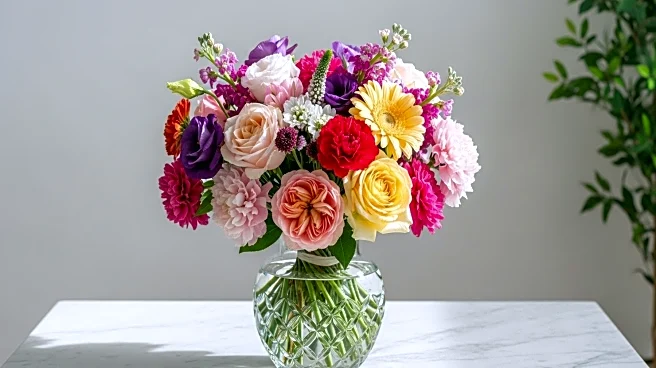What is the story about?
What's Happening?
Florists in Cambridgeshire have reported significant increases in flower prices, affecting sales of popular blooms. Andrea Moat, owner of Elizabeth's Florist, noted that staple varieties like chrysanthemums have seen prices rise up to five times post-Covid and post-Brexit. The British Florist Association attributes these increases to factors such as wage and National Insurance hikes, energy costs, and Brexit-related paperwork. Bonnie Twigg, another florist, mentioned a 130% price increase over the past few years, partly due to reduced production by Dutch growers facing high energy costs. Leah Francombe, a home-based florist, observed changes in wedding flower usage, with couples repurposing arrangements to manage costs.
Why It's Important?
The rising cost of flowers is indicative of broader inflationary pressures affecting various sectors. Florists are struggling to compete with supermarkets, which offer lower prices but potentially lower quality blooms. This situation highlights the challenges small businesses face in maintaining competitiveness amidst economic shifts. The impact on traditional events like weddings, where flowers are now less prioritized, reflects changing consumer behavior driven by financial constraints. The floristry industry, reliant on imports, is particularly vulnerable to international economic fluctuations, emphasizing the interconnectedness of global markets.
What's Next?
Florists may need to adapt by exploring alternative sourcing strategies or diversifying their offerings to remain viable. The industry could see further consolidation as smaller businesses struggle to cope with ongoing price pressures. Stakeholders might advocate for policy interventions to alleviate the impact of energy costs and Brexit-related challenges. Additionally, consumer trends may continue to shift towards more cost-effective floral solutions, prompting innovation in event planning and floral design.
Beyond the Headlines
The floristry industry's challenges underscore broader economic issues such as the impact of international trade policies and energy costs on local businesses. The cultural significance of flowers in events and tributes may evolve as consumers prioritize affordability. This situation also raises ethical considerations regarding sustainable production practices and the environmental impact of importing flowers.
















